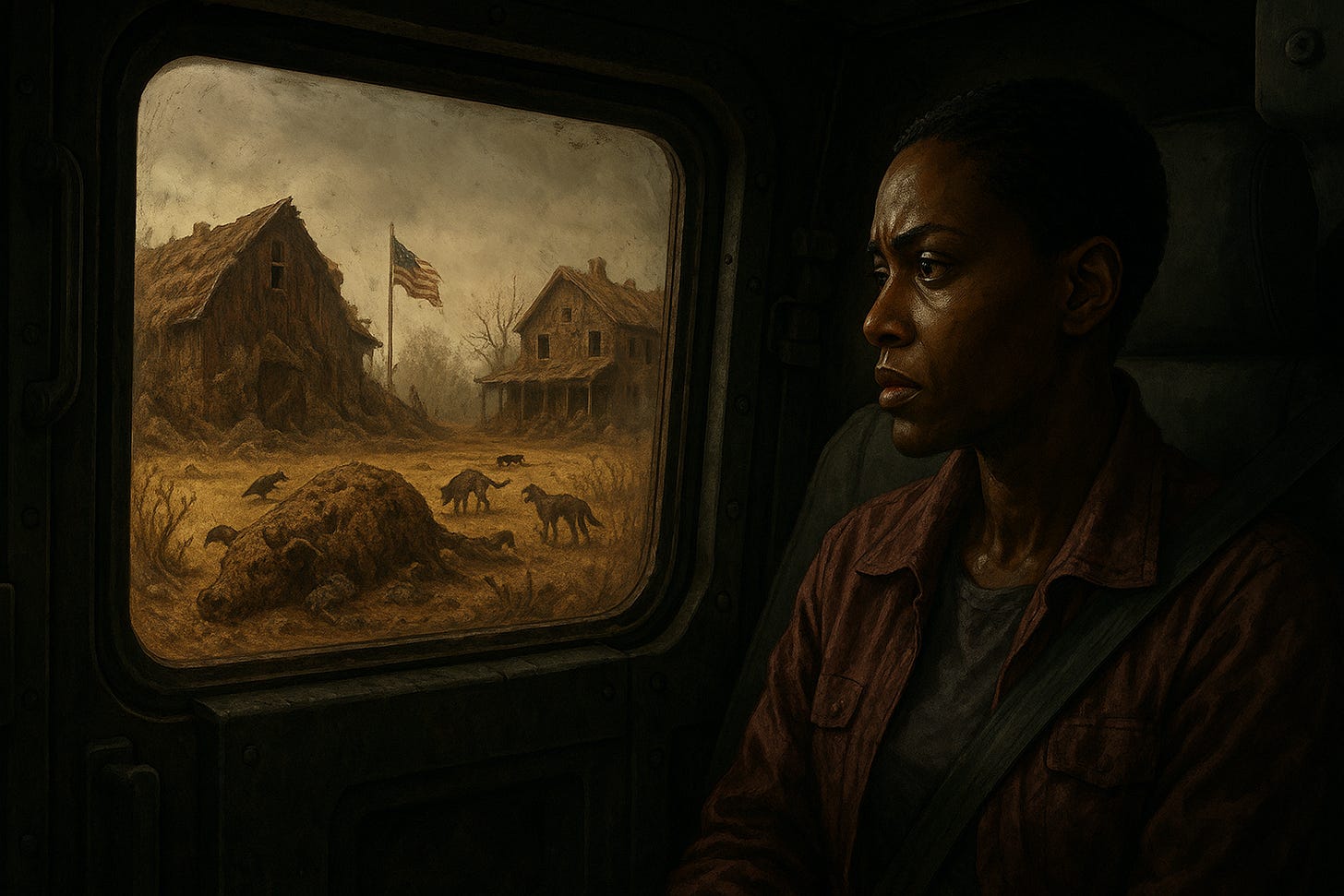You Just Read the First Chapter of My Debut Novel - Join Me for More
Science fiction is an amazing way to explore deep topics - sometimes short stories on a Friday just don't cut it
A few days ago, on Sci-Fi Friday, you met Dr. Samara Makinde.
You didn’t know it then, and neither did she, but her story wasn’t a standalone. What you read on Friday wasn’t just another TCIP short story. It was Chapter One of my debut novel — On the Wings of a Pig — and the opening act of a story I’ve been dreaming about for years.
And now that the secret’s out, I want to tell you why.
The Speculative Mindset
If you’ve been reading The Connected Ideas Project for a while, you know how much I care about technology and public policy. You know that I believe our decisions as a society hinge on how well we understand the tools we build and the consequences they carry. But what you may not know is that science fiction is what taught me that in the first place.
I’ve spent a lot of time in policy rooms filled with people asking, “What happens next?” Whether we’re drafting biotech regulations, exploring AI safety, or sketching out future frameworks for national security, the process always comes down to one thing: we’re telling stories about futures we haven’t lived through yet.
We don’t call them stories, of course. We call them memos, legislation, task force reports. But they are narratives all the same, just speculative fiction in a business suit.
It hit me for real one night in the Pentagon. I was knee-deep in a white paper about synthetic biology and the future of defense, and somewhere between the bullet points and footnotes, I realized I wasn’t just writing policy, I was building a world. Not unlike what I’d seen in the pages of Asimov and Le Guin, or on the screens lit up with cyberpunk dystopias and first-contact dreams. I was using narrative to explore a speculative future in a way that mattered in the present.
That night changed everything.
I’m celebrating becoming a sci-fi author by giving On the Wings of a Pig away to my subscribers, chapter by chapter, every Saturday morning.
From the Situation Room to the Story Room
I started looking at my work differently. I realized that good policy, like good fiction, has to start with a believable premise. It has to consider human motivations, technological constraints, and the ripple effects of a single breakthrough or a single mistake.
That same lens gave me the courage to ask questions policymakers sometimes avoid:
What if we fail?
What if we succeed faster than we’re ready for?
What if the things we call progress come at a cost we didn’t predict?
Those questions are baked into the DNA of science fiction. And so I started using the genre as a tool in my policy work — hosting scenario exercises, referencing films like Gattaca and Her in briefing decks, and encouraging my colleagues to read the occasional short story as part of our foresight work. And then, quietly, I started writing fiction myself. Enter TCIP’s Sci-Fi Fridays.
Because sometimes, policy reports just don’t go far enough. Sometimes, a story is the only way to explore what it would actually feel like to live in a world shaped by our most ambitious or reckless decisions.
Enter Samara Makinde
The character you met on Friday, the geneticist riding shotgun in a Reaper Humvee through the fungal apocalypse, was born from that exact tension between what science can do and what humanity should do.
She’s not a superhero. She’s a woman who studied frog hibernation, got pulled into a global catastrophe, and now finds herself boarding a spaceship as one of humanity’s last best hopes.
If you’ve read my nonfiction writing, you’ll recognize the themes: trust in science, fear of unintended consequences, the complicated ethics of saving some at the expense of others.
Samara’s story came to life at the intersection of my real-world experiences, working inside government agencies, collaborating with scientists at the edge of what’s possible, and wrestling with the moral calculus of progress. Her voice carries echoes of the researchers I’ve worked alongside, the policymakers I’ve debated with, and the survivors I’ve imagined during midnight writing sprints.
Why I’m Giving It Away
Here’s the thing: I didn’t want On the Wings of a Pig to be just another novel on the shelf, discovered by accident or algorithm.
I wanted it to be a conversation.
A serialized, week-by-week exploration of the kind of questions that haunt all of us who care about the future:
How do we choose who gets saved?
What does survival even mean?
When the planet fails us, or we fail it, what do we take with us into the stars?
And so, in honor of the upcoming U.S. holiday that celebrates our independence, I’m making a different kind of declaration:
I’m celebrating becoming an author by giving On the Wings of a Pig away to my subscribers.
Stories that matter don’t need to wait for a publication date. And I’d rather give it away to people who care about this work than only sell it to people who don’t.
Every Saturday morning. One chapter at a time.
I’m calling it the Saturday Morning Serial. Reminiscent of Saturday morning cartoons of childhood, except this time caffeine-laden with your favorite coffee or tea.
Want in? Tap the button. Every Saturday. One chapter at a time.
You’ll be added to the early access list and get a new chapter in your inbox every weekend through the summer. No spam, no spammy sales, just story.
Why This Matters
This novel is more than entertainment. It’s part of a larger experiment.
For the last few years, I’ve been arguing that science fiction isn’t just a genre. It’s a civic tool. It’s a way of exploring emerging technology, pressure-testing policy assumptions, and building empathy for people whose futures might look radically different from our own.
That’s what I wrote about in Science Fiction as a Policy Medium. That’s what drives my work at the intersection of biotechnology, AI, and national security. And that’s what lives inside the pages of this book.
Because when we imagine the future through fiction, we can test its logic. We can challenge its morality. We can see past the slide decks and soundbites and ask, what would this really feel like?
And maybe, just maybe, we can change course before it’s too late.
One More Thing
If On the Wings of a Pig resonates with you, I hope you’ll do one of two things:
Share it. Invite someone else into the serial. It’s free. It’s weekly. And it might just be the best summer story they read this year.
Write back. I’d love to hear what you think. About Samara. About the fungal apocalypse. About what we owe each other when the world starts to fall apart.
Because in the end, storytelling is a two-way street. And the best futures are the ones we write together.
So, welcome to On the Wings of a Pig.
We begin with a woman in a Humvee, and a world on fire. And a pig about to fly.
Some stories save us. This one might.
—Titus
An Aside on the Title
The title On the Wings of a Pig might raise a few eyebrows, and that’s exactly the point.
It’s a nod to the absurd. A play on the impossible. And, more specifically, it’s a quiet tribute to one of my literary heroes: John Steinbeck.
If you’ve ever seen his personal emblem, a whimsical sketch of a winged pig with the word “Pigasus” inscribed beneath it, you’ll understand the reference. Steinbeck used the symbol as a self-deprecating totem, often signing his letters with it. To him, Pigasus represented the writer who aspires to soar but is, by nature, tethered to the mud. A creature of both flight and filth. Inspiration and absurdity. Potential and limitation.
That dichotomy is exactly what this novel explores.
In a world undone by human hubris, where scientific miracles have unintended consequences and survival hinges on improbable decisions, the idea of a pig taking flight becomes more than a joke. It becomes a metaphor for hope, for reinvention, for the maddening and beautiful contradiction of being human.
The people in this book aren’t perfect. They’re not heroes in the traditional sense. They’re scientists and engineers and farmers. They’re scared. They’ve made mistakes — big ones. But they’re also trying, against all odds, to build something better from the ashes of what was.
So yes, the pig flies.
And if that feels impossible, well…that’s what makes it worth doing.



